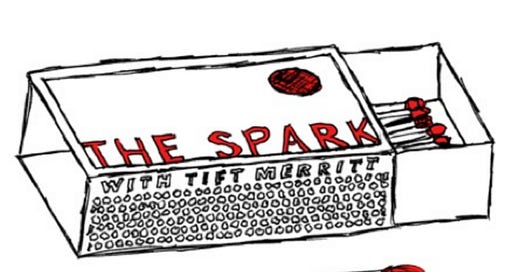About The Spark
I have a beat-up 1986 cassette tape interview with my grandfather. A fifth-grade southern accent rings like an out-of tune-horn against metered sentences from a grown man reluctant to talk about anything. I was looking for what must have been oversimplified truths about wars, loss and resilience. Every time I hear myself ask a question on tape today, I cringe with a similar head shake. But if the Spark has taught me anything, it’s that following the itch of a question without foregone conclusion or transactional reasoning is a really meaningful way to make a go of this life.
I started collecting interviews with artists about process, integrity and making your own way in about 2006, a monthly collaboration with Marfa, Texas Public Radio. I’m guessing it was a podcast before podcasts got their name (For another day, I really hate the word podcast.) I had a beautiful talk with CK Williams about sitting at his desk in Paris writing, nothing for days and months, a mysterious drought which precipitated an unprecedented turning point in his work, the birth of his signature long-line poetry. Rosanne Cash taught me about the growing edge – that magnetic attraction to the very lip of what you know, the urge of pushing into where you must go next. Kiki Smith’s etching tool scratched a canvas as she explained that artists are just rolling around in what they are interested in and that was pretty much the whole of it. Each interview gave me a bead of wisdom in a strand that is now many years long, which I cherish.
Like the interview with my grandfather, what started the Spark was a fierce curiosity about the world inside, and a stark feeling that my map didn’t seem to match up with everybody else’s. As a young person, I thought that feeling would dissipate as I grew up to wherever I belonged, but when that didn’t happen, I realized I better start talking to other artists about making a place of my own. Being the center of attention night after night on the road made me want to listen, look back at the world in some kind of reciprocal energy. Photoshopped pictures and neat press stories made me feel small and distant. Where were the messy questions, the humble real? The world of commercial success seemed really lonely. Meanwhile, I could look at paintings and films and read books that filled me with energy and sent me to the piano. I longed to talk with makers I loved about what their day was like, how they grew with authenticity, what they did when they were stuck. What was this thing of building a life making work? How could I nourish it?
I’m a braver person now than I was sixteen years ago and I’ve weathered my share in part by cornering, with the same embarrassing determination with which I cornered my grandfather, a lot of masterful artists and taking to heart what they told me. People who are making their way share a common set of problems that feel very personal; the nature of leaving the well-worn road can feel like going into the weeds rather than going somewhere new. Conversations about how to navigate this path with wisdom, kindness and fervor is one I will never get tired of having.
The Spark has had several iterations — the humble one where I did all the editing late at night, the spectacular collaboration with Carolina Performing Arts which streamed live for the past two years, the one in process which we offer you now, produced and edited by WUNC’s Charlie Sexton Ormond, who is an angel of a human being. I let go of knowing where the Spark might land many years ago — each interview is significant to me, an end in and of itself. I trust the Spark, too, is finding its own way and I’d best enjoy the mystery of that rhythm.
About This Episode
Rhiannon Gidden’s and I taped this interview in collaboration with Carolina Performing Arts. She took time out from delivering a keynote address in Indiana, writing a ballet and an opera, touring with Our Native Daughters and Francesco Turrisi, and replacing Yo-Yo Ma as Creative Director of Silk Road Ensemble. She was sewing at soundcheck. Her work challenges the legacies of white supremacy in roots music, while amplifying the real history of Black old-time music and its wide and often forgotten influence in our culture. She is an archivist, activist and researcher as well as a performer of meticulous, emotional command. Her mission is to excavate erased music, lift up people whose contributions have been erased, and work towards a more accurate understanding of our country’s musical origins. Her music is her citizenship, in service to connection rather than division.
I recommend listening to this episode to hear her tell the story of America through the banjo. Or to hear her advocate for active listening by comparing streaming to a library with no librarian. The many lessons she brings — where opera and folk music meet, navigating the warping music business, building a web and not a hammer, her passion for the history of African American women and her mother’s very good advice about insisting “What is you thesis statement” — continue to knock around my studio and push me further into the good map of making one’s own way. I hope you find the same. Check it out.






It is so awesome to here your voice and your thoughts!